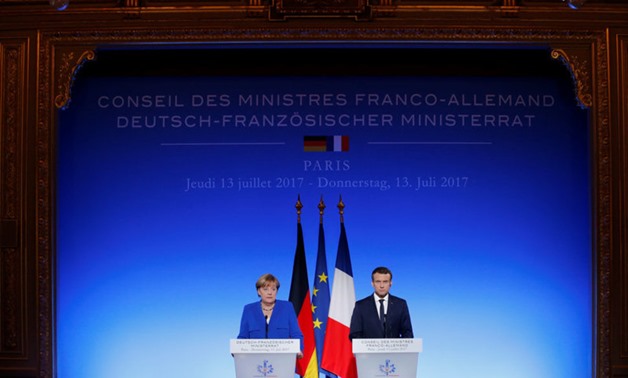
French President Emmanuel Macron and German Chancellor Angela Merkel attend a news conference following a Franco-German joint cabinet meeting at the Elysee Palace in Paris, France, July 13, 2017. REUTERS/Stephane Mahe Reuters
MUNICH - 17 February 2018: Initial details of a planned Franco-German programme to develop a next-generation fighter jet should emerge in the second half of 2018, the head of Airbus's defence unit told Reuters on Friday.
Hoke said France and Germany would work out in coming months how to proceed with the programme, including whether to bring in an additional partner country, such as Britain.
"We expect basic issues, such as how the project will be structured, to be discussed in the second quarter, so that the initial contours will be set in the second half of the year," Dirk Hoke, chief executive of Airbus Defence and Space, said in an interview during the Munich Security Conference.
He said Airbus supported bringing other countries into the programme, which is envisioned as a family of systems rather than just a single new aircraft, noting that other countries could bring their expertise to bear on various aspects.
No decisions had been made on which company would lead the new programme, he said, noting that different firms could lead different segments of the broad project.
Much would also depend on the level of investment pledged by participating countries, he added.
German Chancellor Angela Merkel and French President Emmanuel Macron in July announced plans to jointly develop a successor for the Eurofighter Typhoon.
The new combat system could involve a mixture of manned and unmanned aircraft and would eventually replace the Rafale and Eurofighter, rival jets that compete fiercely for global sales, as well as the older Panavia Tornado.
Hoke said it was imperative to avoid mistakes made in the last big European military programme, the troubled A400M military transporter, which has been plagued with cost overruns and technical challenges.
"It's important that the specifications (for the new fighter jet programme) are developed with a sense of proportion," he said. He said it was important to "prevent requirements that are too comprehensive and that cannot be delivered by industry."
Airbus this week took a further 1.3 billion euro ($1.6 billion) charge on the A400M programme for 2017, bringing total charges on the project to over 8 billion euros. But it said agreement by NATO buyers to stretch out the delivery schedule and accept certain changes would limit future losses.
Hoke lauded an agreement reached this month by NATO buyers, Airbus and the OCCAR pan-European procurement agency to negotiate a new delivery schedule for the aircraft.
He said he was confident that agreements with individual countries could be finalised by the end of the year, and said the declaration of intention had helped repair frayed relations with A400M buyer nations.
"It was a very constructive cooperation, and there was strong support from all participants," he said. "I believe we have significantly improved relations."
Hoke said Airbus expected to release details about the next steps on a European programme to develop a drone by late April at the Berlin air show. ($1 = 0.8059 euros)

Comments
Leave a Comment